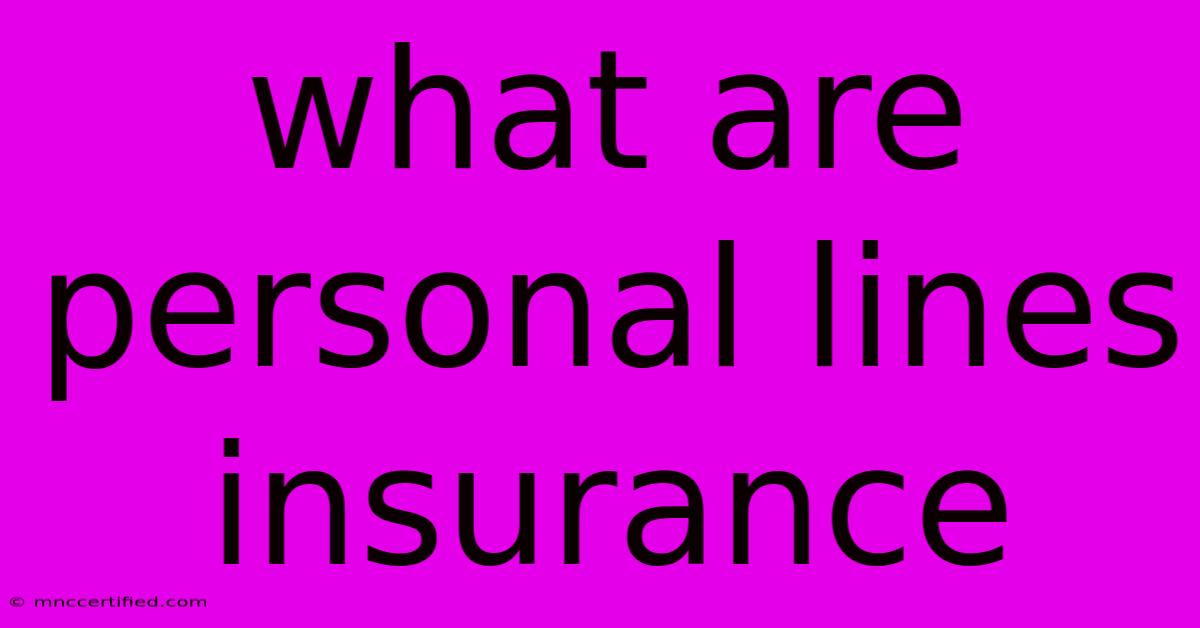What Are Personal Lines Insurance

Table of Contents
What are Personal Lines Insurance? A Comprehensive Guide
Personal lines insurance is a crucial aspect of financial planning, protecting individuals and their families from unforeseen events. Understanding its nuances is vital for securing your future and safeguarding your assets. This comprehensive guide will demystify personal lines insurance, exploring its different types, benefits, and how to choose the right coverage.
What Exactly is Personal Lines Insurance?
Personal lines insurance encompasses a range of insurance products designed to protect individuals and their households from various risks. Unlike commercial insurance, which covers businesses, personal lines insurance focuses on personal assets and liabilities. This includes protection against financial losses resulting from accidents, illnesses, damage to property, or legal liabilities. Think of it as a safety net for your personal life.
Key Features of Personal Lines Insurance:
- Individual Focus: Policies are tailored to meet the specific needs of individuals and families.
- Personal Assets Protection: Covers homes, vehicles, personal belongings, and other valuable possessions.
- Liability Coverage: Protects against financial losses arising from legal liabilities, such as accidents causing injury or damage to others.
- Risk Management: Helps mitigate financial risks associated with various life events.
Types of Personal Lines Insurance:
Several types of insurance fall under the personal lines umbrella. Understanding each is key to building a robust protection plan.
1. Homeowners Insurance:
This is arguably the most crucial personal lines insurance policy. It covers your home and its contents against various perils, including fire, theft, vandalism, and certain weather events. Homeowners insurance also typically provides liability protection if someone is injured on your property.
Key Considerations: The level of coverage needed depends on the value of your home and its contents. Consider factors like your location (prone to natural disasters?), the age of your home, and the value of your possessions when choosing a policy.
2. Renters Insurance:
Even if you don't own your home, renters insurance is vital. It protects your personal belongings from damage or theft, and it provides liability coverage if someone is injured in your apartment. It's surprisingly affordable and offers peace of mind.
Key Considerations: Inventory your belongings regularly to accurately assess your coverage needs.
3. Auto Insurance:
Auto insurance is legally mandated in most jurisdictions. It covers damages to your vehicle and liability for injuries or damages caused to others in an accident. Different types of auto insurance cover various situations, including collision, comprehensive, and liability coverage. Understanding the different coverage levels is crucial to making an informed decision.
Key Considerations: Your driving history, the type of vehicle you drive, and your location significantly impact your premium.
4. Umbrella Insurance:
Umbrella insurance provides an additional layer of liability protection beyond your homeowners and auto insurance policies. It covers significant liabilities that exceed the limits of your other policies, providing crucial financial security in the event of a major lawsuit.
Key Considerations: This is particularly beneficial for high-net-worth individuals or those with higher risk profiles.
5. Life Insurance:
While not strictly property insurance, life insurance is often considered part of a comprehensive personal lines strategy. It provides financial security for your dependents in the event of your death, helping to cover expenses and maintain their lifestyle.
Key Considerations: Choose a policy type (term, whole, universal) that best aligns with your needs and financial goals.
Finding the Right Personal Lines Insurance:
Choosing the right insurance involves careful consideration of your individual needs and risk tolerance. Here are some crucial steps:
- Assess Your Risks: Identify potential risks to your property, assets, and liabilities.
- Compare Quotes: Obtain quotes from multiple insurers to find the best rates and coverage.
- Review Policy Details: Carefully read your policy documents to understand the coverage, exclusions, and limitations.
- Adjust Coverage as Needed: Regularly review your policies to ensure they still meet your evolving needs.
Keyword Optimization: This article naturally incorporates keywords like "personal lines insurance," "homeowners insurance," "renters insurance," "auto insurance," "umbrella insurance," "life insurance," "liability coverage," "risk management," and variations thereof, ensuring strong SEO performance. The use of headers, bold text, and a clear structure further enhances readability and search engine optimization.
Off-Page SEO Strategies: Promotion on social media, guest blogging on relevant insurance websites, and building high-quality backlinks are crucial off-page SEO strategies to enhance search engine rankings. Engaging with relevant online communities and forums also helps establish authority and build brand awareness.

Thank you for visiting our website wich cover about What Are Personal Lines Insurance. We hope the information provided has been useful to you. Feel free to contact us if you have any questions or need further assistance. See you next time and dont miss to bookmark.
Featured Posts
-
Shingles Blown Off Roof Insurance
Nov 19, 2024
-
Australia Sweeps Pakistan Zampa Stoinis Star
Nov 19, 2024
-
Actor Paul Teal One Tree Hill Passes Away
Nov 19, 2024
-
Northfield Insurance Company Naic
Nov 19, 2024
-
Street Style And Luxury Travis Kelces Look
Nov 19, 2024